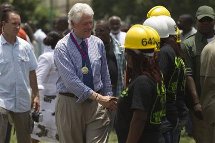TEHRAN – Iran on Monday said the two warships began producing high-speed missile launchers along the coastline and surrounding sea routes vital Strait Hrmuz. Inauguration of rapid production of ships and Zolfaqar Seraj a day after President Mahmoud Ahmadinejad inaugurated an unmanned bomber aircraft produced in the country, which he referred to would send a “death” to Iran’s enemies. IRNA official news agency announces Seraj (Lights) and Zolfaqar will be produced at the industrial complex naval defense ministry.Defense Minister Ahmad Vahidi was inaugurated, said the ships will help strengthen the defense forces of Iran, IRNA said.
“Today, the Islamic Republic of Iran’s defense industries rely on the army and junk (Revolutionary Guards) is strong and the military, with their full strength, can guarantee security in the Persian Gulf, Oman Sea and the Strait of Hormuz,” said Vahidi.IRNA Zolfaqar is preaching a new generation of ship missile launcher that can be used for patrol and attack operations.
The ship was designed for rapid strikes against ships and equipped with two missile launchers, two machine guns and a computer system for controlling the missiles, “says the news.Fars news agency quoted the statement as saying Zolfaqar Vahidi is equipped with a cruise missile Nasr (Victory) “which has a tremendous destructive power.Iran has previously said Nasr missile can destroy targets up to 3000 tons.
IRNA preach, Seraj, specially designed for tropical climates, also serves as a vessel of war for use in the Caspian Sea, the Gulf and the Gulf of Oman and can fire rockets and also used in violent seas,The launch of the productions were done to coincide with the annual activities of a “government week”, a period when the country is usually announced the successful ituh latest technology.
Ahmadinejad, on Sunday inaugurated a small unmanned bomber, a period when the country was generally indicates the success of new technology.Ahmadinejad, on Sunday inaugurated an unmanned bomber aircraft with a cruising range of up to 1.000km he called “the ambassador of death.” State media said the bomber, stable (Striker), can carry four rudat stealth cruise, two bombs each weighing 115kilogram or a sophisticated missile weighing 230 tons.
Tehran claims its military began on Friday when it fired a ground-to-surface missile, named Qiam (Resurrection), and there will be some more announcements in the next few days.The Islamic Republic is also expected to test the third generation missile Fateh (Conqueror) 110, after the exhibit’s version of the missile has a range of 150 to 200kilometer shoot.
Iran recently held four mini-Ghadir submarine built in the DSLAM country, a ship “invisible”, designed to be operated in such shallow peairan Bay.”The latest military activity coincided with warnings against any attack on Iranian territory.
Implacable foe, the United States and Israel, not military action involving Iran’s controversial nuclear program it.Iran has threatened to close the Strait of Hormuz, where about 40 percent of the oil tanker through those waters in case of a military attack.(AFP)


